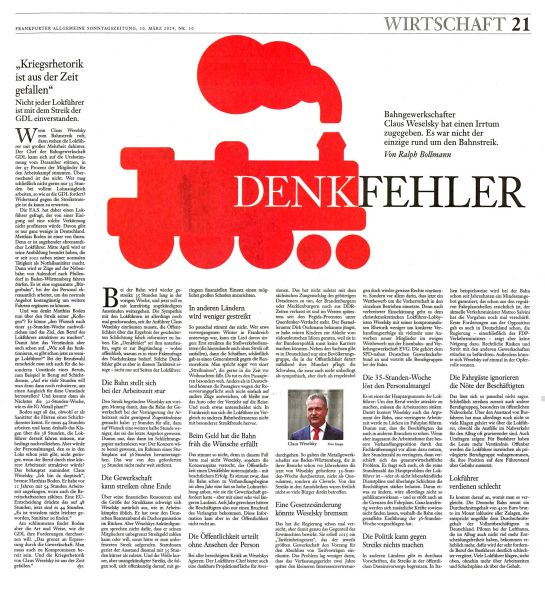Let the Unions Run the Company
On November 16, 2023, the engineers of the German Railway Company, die Deutsche Bahn or DB, called a strike. They called for another strike for January 24th to the 29th of 2024. Newspaper reports estimated that the strikes stopped 80 % of rail traffic in Germany. Having to find alternate means of transport cost commuters an estimated billion Euro.
The striking engineers belong to a union called "die Gewerkschaft der deutschen Lok-Führer", or its acronym GDL. The strike resulted from the executive board of DB rejecting the GDL's demand for a 10.5% pay-hike and a 35-hour work-week. Although the GDL's leader Claus Weselsky took a lot of heat for leading a strike, newspaper reports indicated that 97% of the union's membership had voted for it, so Weselsky really didn't have any choice.
He eventually stood down and Mario Reiß replaced him. Regarding the shorter work-week, critics complain that DB does not have enough engineers as it is, even for a 40-hour work-week. "So, hire more people," the union retorted. But a critic poses the question, "What will happen next, a 32-hour work-week?" Other corporations have already granted their workers a 32-hour week. A labor-union has to stay busy, if only to justify its existence.
So I went, as usual, to Wikipedia to find out more about Deutsche Bahn: It has a board of directors, a chairman of the board, and defines itself as an Aktiengesellschaft, or AG. In English, that means that the Deutsche Bahn is a publicly traded company; but the German Wikipedia describes it as "Bundeseigentum", or "Federal Property". Another critic of Deutsche Bahn's ongoing problems complained, "Es fehlt der politische Mut", meaning that the politicians lack the courage to rein in the excesses of one of their own departments.
Perhaps the GDL union would not push DB so hard for concessions, if DB was a private concern, with the private concern's quarterly need for growth and profit; but DB is just another government department. The union hopes to get a bigger share of the federal budget, and it has succeeded pretty well, so far.
If I could put my two cents in, I would make another suggestion: Privatize the DB and offer its leadership to the unions. Let the unions pocket whatever profit DB makes. Passenger fares would pay for the union's expenses going forward. Perhaps, ownership of the firm would convince the unions not to strike so often, for their own sake. There's nothing like self-interest to bring people to their senses, by letting them know that the consequences of their actions will affect their personal sphere.
But would the unions accept such an offer? If they accepted ownership of the DB, they would call the shots, make the rules, set the price of rail-tickets, and most importantly they would establish the pay-scale—everyone from the executive staff, the accountants, porters, lavatory-cleaners, and rubbish collectors. They would own the firm in the form of shares of stock. DB is already a publicly-traded company. Now, the unions would own most of it.
In this country, the employees own the Publix grocery-store chain. At one time, the employees at United Airlines owned that company as well, but the deal fell through after a year or two, because the various unions representing the employees could not get along. Even after the employees received 55% of the value of the stock, individual unions wanted to go on strike, while the others did not. As one journalist expressed it, the contentious relations among the individual unions signalled a return of the "us-against-them" mentality that was such a headache for the parent company.



